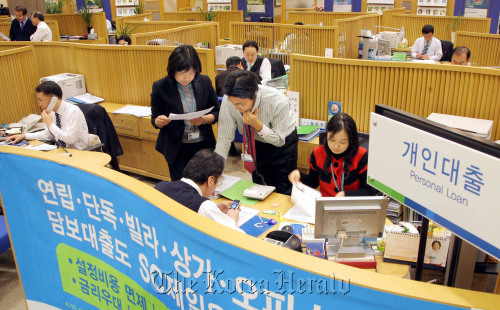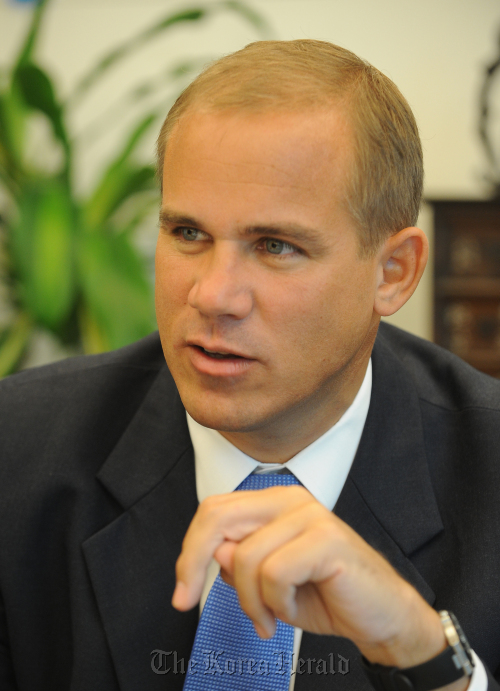 |
A branch office of SC First Bank. (The Korea Herald) |
Lender pushes reform of compensation system, name change, manpower restructuring
SC First Bank, the Korean unit of the London-based financial group Standard Chartered, will drop the “First” from its name starting next year.
The bank’s name was a result of the British firm’s 2005 acquisition of Korea First Bank, established in 1929.
Last week, a new signboard reading “Standard Chartered” appeared on its head office in Jongno, Seoul. Its nationwide branches are also replacing their signboards.
For Standard Chartered, which operates in more than 70 countries, Korea is the only country where a local name, “Jeil” ― or “First” ― is embedded in the official name.
The third-biggest financial group in Europe obtains 6 percent of the group’s $5.1 billion in global pre-tax profits from its Korean operations.
The name change provoked speculation that the group may put the bank up for sale and leave the Korean financial market.
But the Korean unit has dismissed these rumors and said the change comes as it “aims to utilize Standard Chartered Group’s corporate image” and generate synergy by merging the bank’s name with the group’s global brand.
Financial markets here appear to be positive about the name change.
“Dropping the ‘First’ is a symbolic integration with its parent group and it’s a positive development for the bank as having the same name with its parent will make the local unit more marketable,” said Chang Hea-kyu, Fitch Rating’s director for financial institutions in Asia Pacific. “It could mean that more support is in store from the parent group,” he added.
Other financial analysts say the name change also symbolizes the management’s determination to enforce changes in its pay system after going through the longest labor strike in the country’s banking history over the summer.
“They (the management) know the labor union is very aggressive, and dropping the Korean name is read as an expression that they won’t be swayed by their workers,” said an analyst on condition of anonymity.
The name change is just one of the reforms SC First Bank is aggressively pursuing ― to mixed reactions from the Korean financial industry.
CEO Richard Hill started the reforms in May with a push to introduce a performance-based pay system. The Western-style pay system differs from the Korean banking industry’s culture of paying workers based on experience and seniority.
 |
SC First Bank CEO Richard Hill. (The Korea Herald) |
The bank paid dearly for the initial reform.
The labor union vehemently resisted the new pay system which the bank said would raise efficiency. In protest, about half of the bank’s 6,500 employees went on a general strike for eight weeks from June, leaving banking services crippled.
The strikers returned to their workplaces despite the bank’s hard-line stance on the new pay system.
The bank is now accelerating its manpower restructuring. It completed an early retirement program for executive-level employees in October and is now taking applications for voluntary redundancy for those who are aged 35 or older and have worked at the bank for over a decade.
Market insiders agree that the bank’s new pay system and manpower restructuring will make the lender more marketable by boosting profits in the long run.
“More layoffs and the shift to a performance-based pay will make its management costs more flexible,” Fitch Rating’s Chang said.
But there are concerns that the changes may create more disparities within the organization.
“Sure the performance based system will bring more money, but without a clear definition of how the performance will be measured, there will always be disputes within the bank,” said a state-run bank official, asking not to be named.
“For example, while performance can be measured by sales in some departments, those in human resources or marketing would have to deal with bigger wage gap under assessments they didn’t really agree to or understand,” he said.
A commercial bank official said the new pay system would be a success in Korea only when the evaluation on performance is applied to branches, not individuals.
By Cynthia J. Kim (
cynthiak@heraldcorp.com)









